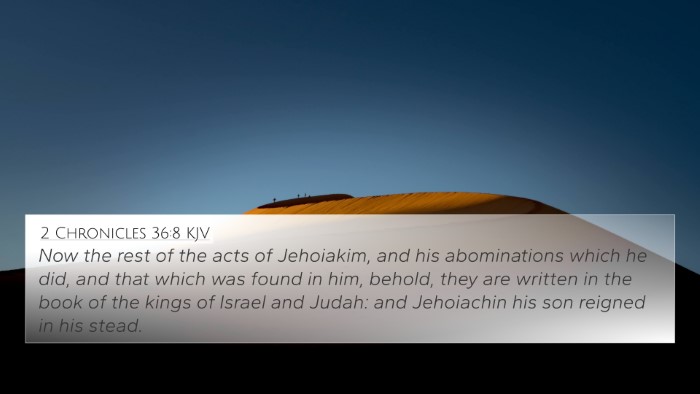Old Testament
Genesis Exodus Leviticus Numbers Deuteronomy Joshua Judges Ruth 1 Samuel 2 Samuel 1 Kings 2 Kings 1 Chronicles 2 Chronicles Ezra Nehemiah Esther Job Psalms Proverbs Ecclesiastes Song of Solomon Isaiah Jeremiah Lamentations Ezekiel Daniel Hosea Joel Amos Obadiah Jonah Micah Nahum Habakkuk Zephaniah Haggai Zechariah Malachi2 Kings 24:6 Similar Verses
2 Kings 24:6 Cross References
So Jehoiakim slept with his fathers: and Jehoiachin his son reigned in his stead.
Uncover the Rich Themes and Topics of This Bible Verse
Listed below are the Bible themes associated with 2 Kings 24:6. We invite you to explore each theme to gain deeper insights into the Scriptures.
2 Kings 24:6 Cross Reference Verses
This section features a detailed cross-reference designed to enrich your understanding of the Scriptures. Below, you will find carefully selected verses that echo the themes and teachings related to 2 Kings 24:6 KJV. Click on any image to explore detailed analyses of related Bible verses and uncover deeper theological insights.

Jeremiah 22:18 (KJV) »
Therefore thus saith the LORD concerning Jehoiakim the son of Josiah king of Judah; They shall not lament for him, saying, Ah my brother! or, Ah sister! they shall not lament for him, saying, Ah lord! or, Ah his glory!

2 Chronicles 36:6 (KJV) »
Against him came up Nebuchadnezzar king of Babylon, and bound him in fetters, to carry him to Babylon.

Jeremiah 36:30 (KJV) »
Therefore thus saith the LORD of Jehoiakim king of Judah; He shall have none to sit upon the throne of David: and his dead body shall be cast out in the day to the heat, and in the night to the frost.

2 Chronicles 36:8 (KJV) »
Now the rest of the acts of Jehoiakim, and his abominations which he did, and that which was found in him, behold, they are written in the book of the kings of Israel and Judah: and Jehoiachin his son reigned in his stead.
2 Kings 24:6 Verse Analysis and Similar Verses
Understanding 2 Kings 24:6
Verse: 2 Kings 24:6 states, "So Jehoiakim slept with his fathers; and Jehoiachin his son reigned in his stead." This verse marks a significant turning point in the history of Judah, emphasizing the transition of kingship and the unfolding historical narrative of God's people.
Summary of Meaning
This passage encapsulates the fate of Jehoiakim and the subsequent rise of his son Jehoiachin. The political and spiritual implications are deeply etched within this brief narrative, reflecting God's sovereignty and the realities of human governance.
Historical Context
The context of 2 Kings 24:6 is situated during a tumultuous time in Judah’s history. Following the reign of Jehoiakim, his son Jehoiachin ascends to the throne amidst a backdrop of impending Babylonian conquest. This transition symbolizes not only a generational shift but also a continuation of God's judgment on Israel due to persistent disobedience.
Commentary Insights
-
Matthew Henry:
Matthew Henry notes the brevity with which the reign of Jehoiachin is described, highlighting the vanity of kingship in the face of divine sovereignty. His commentary points out that Jehoiakim's death follows a pattern seen throughout the histories of the Israelite kings—rising and falling under heaven's decree.
-
Albert Barnes:
Barnes elucidates that the term "slept with his fathers" is an idiom indicating a king's death in peace, contrasting the tragic fate of many other rulers. He emphasizes that Jehoiakim's reign ended abruptly, underscoring the instability of the Judean monarchy during this period of Babylonian dominance.
-
Adam Clarke:
Adam Clarke elaborates on the character of Jehoiakim, suggesting that his reign was marked by rebellion against God. Clarke discusses the implications of Jehoiachin's subsequent rise as a critical point, presaging the eventual exile of the Jewish people to Babylon, showing the inevitable consequences of a nation that forgets its covenant with God.
Cross-References
2 Kings 24:6 connects significantly with several verses that illuminate its themes of kingship, judgment, and God's sovereignty. Here are some relevant cross-references:
- 2 Kings 23:34 - Discusses the reign of Jehoiakim.
- Jeremiah 22:18-19 - Prophecy regarding the fate of Jehoiakim.
- 2 Chronicles 36:5-8 - Summarizes the reigns of Jehoiakim and his successor.
- Ezekiel 19:5-9 - Speaks of the fall of the royal line.
- 2 Kings 25:27-30 - Relates to the fate of Jehoiachin in exile.
- Isaiah 39:5-7 - Prophecy concerning the futility of reliance on foreign alliances.
- Daniel 1:1-2 - Nebuchadnezzar's siege of Judah ties back to this period.
Inter-Biblical Connections
Connecting this verse with others reveals greater thematic insights:
- Comparisons can be drawn between the reigns of the last kings of Judah and the earlier, more righteous kings.
- The linkage between the Old Testament narratives concerning the monarchy and New Testament references to Jesus as the ultimate King of Kings provides a robust framework for understanding Israel’s history under God’s providence.
- Investigating how prophetic books—like Jeremiah, which speaks directly about the fate of the kings—sheds light on the events led by Jehoiakim and Jehoiachin.
Thematic Connections
Exploring the thematic connections between this verse and other scripture enhances comprehension:
- Judgment: The judgment against Jehoiakim reflects broader biblical themes of divine retribution and consequence for disobedience, as echoed in Romans 1:18.
- Leadership: The transition between kings showcases the fragility of human leadership, paralleled in James 4:13-15 regarding the uncertainty of life and plans.
- Hope: Despite the grim backdrop, prophecies later reveal hope (like in Jeremiah 29:11), asserting God's ultimate plan for restoration.
Conclusion
Through cross-referencing, thematic exploration, and commentary insights, we can distill a richer understanding of 2 Kings 24:6. This verse does not merely report a historical fact but encapsulates a significant moment in biblical history, signaling both the end of an era and the onset of critical prophetic fulfillments. Engaging with this text encourages deeper study into the interconnectedness of God's Word and His enduring sovereignty over the affairs of humanity.


